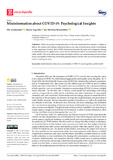| dc.contributor.author | Anastasiades, Elly | |
| dc.contributor.author | Argyrides, Marios | |
| dc.contributor.author | Mousoulidou, Marilena | |
| dc.date.accessioned | 2022-01-12T08:44:36Z | |
| dc.date.available | 2022-01-12T08:44:36Z | |
| dc.date.issued | 2021 | |
| dc.identifier.issn | 2673-8392 | |
| dc.identifier.uri | http://hdl.handle.net/11728/12076 | |
| dc.description.abstract | Definition: While the precise conceptualization of the term misinformation remains a subject of
debate, the current entry defines misinformation as any type of information which is misleading
or false, regardless of intent. The COVID-19 pandemic has seen the rapid and widespread sharing
of misinformation on a global scale, which has had detrimental effects on containment efforts and
public health. This entry offers psychological insights to better our understanding of what makes
people susceptible to believing and sharing misinformation and how this can inform interventions
aimed at tackling the issue. | en_UK |
| dc.language.iso | en | en_UK |
| dc.publisher | MDPI | en_UK |
| dc.relation.ispartofseries | Encyclopedia 2021;1, pp. 1200–1214 | |
| dc.rights | © 2021 by the authors | en_UK |
| dc.rights.uri | http://creativecommons.org/licenses/by-nc-nd/4.0/ | en_UK |
| dc.subject | Research Subject Categories::SOCIAL SCIENCES::Social sciences::Psychology | en_UK |
| dc.subject | misinformation | en_UK |
| dc.subject | fake news | en_UK |
| dc.subject | social media | en_UK |
| dc.subject | COVID-19 | en_UK |
| dc.subject | social cognition | en_UK |
| dc.subject | public health | en_UK |
| dc.title | Misinformation about COVID-19: Psychological Insights | en_UK |
| dc.type | Article | en_UK |
| dc.doi | 10.3390/encyclopedia1040091 | en_UK |


